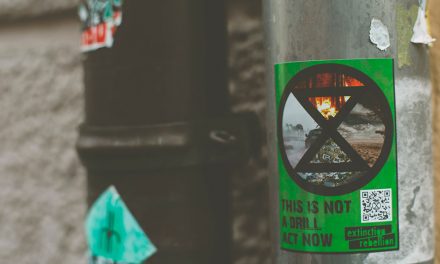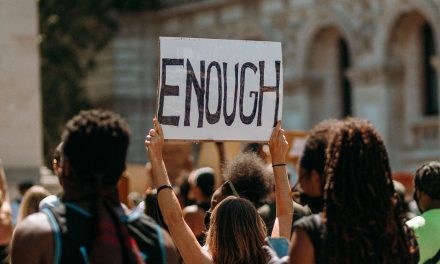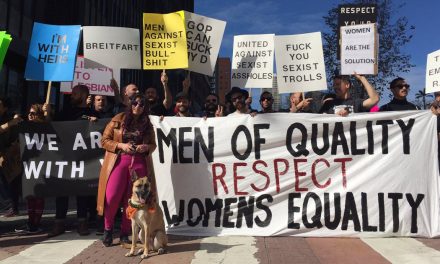SOAPBOX
★ ★ ★ ★
Growing Up Solastalgic
By Mike Hembury
Children are notoriously adaptable. They will make a playground out of a bomb crater, toys from ammunition cases, necklaces and whistles out of spent cartridges. What is new to you, will just be normal to them. You might detect some seismic change in the world you know, but for children, it’s just the normality of their environment.
I remember one time when my daughter was small, about nine or 10, and we were talking about saving the whales. And she just looked at me and said, ‘Don’t you think it’s too late for all that?’ I remember being stunned, as if a new geological age had arrived and I had failed to notice. It shocked me to think that my child was growing up in a world in which she accepted that the whales were on the way out. But it made sense, I guess. I didn’t question the demise of the horse-drawn carriage. I didn’t mourn the dodo or the passenger pigeon. So why should she get worked up about a given fact of life? But it shocked me all the same. Perhaps it was just projection on my part. It wasn’t that I was expecting her nine-year-old self to share my outrage, or to feel my pain at the changes the planet and the ecosphere were undergoing. But the resignation implicit in what she said was totally unexpected.
Although your natural instinct might be to shield your kids from knowledge you think is going to harm them, you also know—maybe consciously, maybe not—that you want them to grow up to be angry about the stuff that you yourself get agitated about: cultural intolerance, prejudice, oppression, resurgent fascism, ecocide, crass inequality.
But maybe a lot of the time they just veer between adaptation and shell-shock.
I’m not even talking about obvious trauma like growing up in a war zone. There is a more subtle form of damage being done to all of us, but of course, especially to children. And that is the deep-seated pain of being in a violent world which is careening headlong into irreparable environmental damage.
There is even a word for such death of hope: solastalgia.
Solastalgia is usually defined as distress caused by environmental change.
We’d better get used to it, because the future looks set to be one big-time solastalgic fuck-up.
I remember being a radicalised twenty-something and despising my parents for their acquiescence, their passivity, their faith in the system. How much more are our kids going to condemn us for not putting a stop to what we know is happening? For the damage we know we are inflicting on future generations?
Of course, part of the problem is our seeming inability to bring about meaningful change.
The various social forms of global capitalism have one thing in common. They strive to maximize the disempowerment of their citizens, either by buying them off, neutering them with consumer goods and so-called entertainment, or by naked repression.
I read an interesting article recently by Rob Hopkins, one of the leading figures in the Transition Movement. And if you’re not familiar with the Transition Movement, it’s basically about preparing for life after the oil has run out, with a focus on small-scale, eco-friendly, local community resilience. The Transition Movement views our society’s addiction to oil as comparable to alcoholism. They also have a six-point plan for recovery comparable to that of alcoholics anonymous. In the article, governments were compared to overweening parents that treat the rest of us like children.
This struck a chord with me. I think it’s true to say that our situation is one of artificial childhood. Or perhaps, more accurately, our situation as a society is like that of the children of alcoholics and junkies.
For them, growing up is a deeply traumatic experience.
They are totally dependent on parents whose irrational behaviour and mood swings they have to negotiate. In many cases their lives are scarred not just by the needs of survival, but by the deeper scars of mental, physical, emotional or even sexual abuse. For a kid to emerge from such a childhood anywhere near whole is in itself a small miracle. And yet, in a way, without wanting to trivialize or belittle the suffering of abuse survivors, this is the situation we, as a generation, as a society, all face.
We are hunkered down, passive and shell-shocked at the enormity of the changes happening around us. We conduct business as usual as if somebody somewhere, one of the adults maybe, will sort it out for us. We are happy to project our powerlessness, our sense of outrage, onto our kids, onto the generation that is just coming of age. But it is our own failure—one of historical dimensions—that we are lamenting. Maybe the new generation doesn’t know much, but it doesn’t know failure either.
Just as growing up involves freeing yourself from dependence on your parents, so the challenge facing us is to free ourselves from those who rule our destinies, yet who most certainly do not have our best interests at heart.
Even in the face of overwhelming scientific evidence that our economic system is destroying the planet, the painful, brutal fact is that money rules, and will continue to do so for as long as it can.
So if there is one thing that needs nurturing, it is a spirit of resistance. Even in the most hopeless of situations, a glimmer of hope can appear. It is knowing how and when to seize on that spark, to make that leap, that is the key to change, the key to growth, the key to the revolution that we know we’re going to need.
The key to taking our lives into our own hands.
Because business as usual just ain’t doing it.
One of the great maxims of the European student revolts of 1968 was: ‘you’ve got no chance, but you’d better use it.’
So whatever your age, it’s time to grow up.

Mike Hembury is an Anglo-Berliner originally from Portland, England. He’s a writer, translator, musician, coder, sailor, environmentalist and guitar nerd in no particular order. You can check out some of Mike’s music projects here:
www.miserlou.de
www.balkonians.de
www.skarabaeus-berlin.de



























